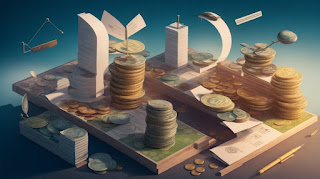Understanding the Meaning of Economics
Introduction
Economics is a fundamental field of study that explores how
societies allocate their limited resources to fulfill unlimited wants and
needs. It delves into the behavior of individuals, businesses, and governments
in the context of producing, distributing, and consuming goods and services. In
this article, we will break down the meaning of economics, its key concepts,
and its significance in understanding the dynamics of our world.
Table of Contents
- Defining
Economics - Scarcity
and Choice - Supply
and Demand - Resource
Allocation - Microeconomics
and Macroeconomics - The
Role of Economists - Economics
in Everyday Life - Conclusion
Defining Economics
Economics can be defined as the social science that examines
how individuals, households, businesses, and governments make decisions to
allocate resources to satisfy their wants and needs. It is concerned with
understanding how limited resources are used to produce goods and services and
how these goods and services are distributed among different individuals and
groups.
Scarcity and Choice
A central concept in economics is scarcity, which refers to
the limited nature of resources in comparison to the unlimited wants and needs
of individuals and society. Due to scarcity, individuals and societies are
forced to make choices about what to produce, how to produce, and for whom to
produce.
Supply and Demand
Supply and demand are fundamental concepts in economics that
influence the pricing and availability of goods and services. Supply represents
the quantity of a product that producers are willing to provide, while demand
represents the quantity that consumers are willing to purchase. The interaction
of supply and demand determines market prices and quantities.
Resource Allocation
Economics examines how resources such as labor, capital,
land, and entrepreneurship are allocated to different economic activities.
Efficient resource allocation is a key goal of economic systems, as it ensures
that resources are used in a way that maximizes their value and benefits
society.
Microeconomics and Macroeconomics
Microeconomics focuses on the behavior of individual
consumers, firms, and industries, analyzing how they make decisions and
interact in markets. Macroeconomics, on the other hand, studies the broader
economy as a whole, including factors like inflation, unemployment, economic
growth, and government policies.
The Role of Economists
Economists are professionals who study and analyze economic
trends, policies, and issues. They use tools such as economic models, data
analysis, and statistical techniques to provide insights into how the economy
functions and to offer recommendations for improving economic outcomes.
Economics in Everyday Life
Economics has a significant impact on our daily lives. It
influences decisions about what to buy, how to save, where to work, and how
governments design policies that affect our well-being. Understanding economic
principles can help individuals make informed choices and navigate the
complexities of the modern world.
Conclusion
In conclusion, economics is a vital field of study that
examines the allocation of resources in the face of scarcity. It encompasses
concepts like supply and demand, resource allocation, microeconomics, and
macroeconomics. Economists play a crucial role in analyzing economic trends and
providing insights to guide policy and decision-making. Economics has a
far-reaching impact on society, shaping how individuals, businesses, and
governments make choices that impact our well-being and the overall functioning
of our world.







